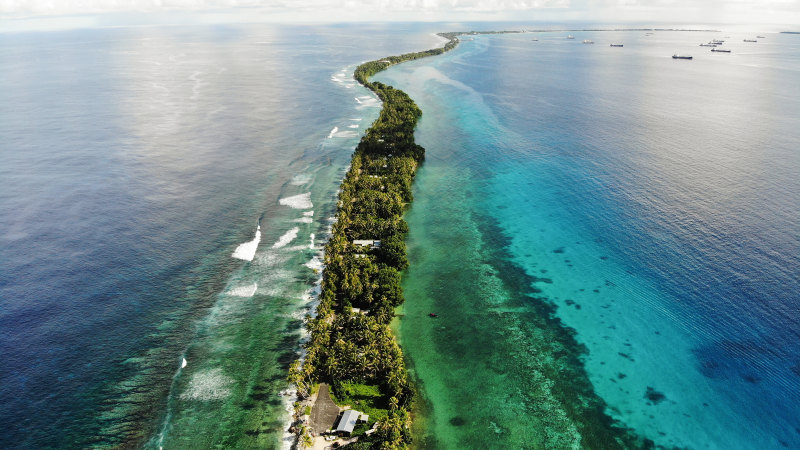International pressure grows to fast-track Pacific lottery visa

Save articles for later
Add articles to your saved list and come back to them any time.
Australia is facing international pressure to introduce a promised visa lottery for Pacific workers as island nations deal with climate change’s “existential threat” and legislation to enact the change remains bogged down in parliament.
The Albanese government announced the Pacific Engagement Visa in February to bring in 3000 Pacific nationals annually, with the US green card-style measure initially slated to begin in July amid a broader overhaul of Australia’s migration settings.
The effects of climate change in Pacific nations should prompt new migration solutions, Fijian deputy prime minister Biman Prasad says.Credit: Joe Armao
But Labor has been forced to negotiate the passage of the bill with the Greens after it became mired in the Senate when the Coalition opposed it.
Fijian deputy prime minister and minister for finance Biman Prasad has raised concerns about the legislation becoming stuck in Australia’s parliament, saying economic ministers in the Pacific forum welcomed the opportunity for greater ties and investment that the visa would bring.
“These steps for deeper integration should not be delayed any more,” Prasad, an economist, told this masthead. “Given the existential threat from climate change in many Pacific Island counties, it is time to think of new ideas.”
A spokesperson for Greens immigration spokesman Nick McKim said the party was negotiating with Labor over the bill.
Prasad said he knew the Greens stood “very strongly” for mitigating the catastrophic impacts of climate change, adding the ease of travel between countries was one such factor.
Coalition immigration spokesperson Dan Tehan, and Pacific spokesperson Michael McCormack, both said they support the concept of the visa, but oppose it being done via a ballot.
“Australian citizenship is too important to be decided by drawing names out of a hat,” Tehan said, accusing the government of pursuing a policy that could lead to regional brain drain.
The two-step scheme will require those who succeed at the first stage to secure a job offer in Australia and meet tests to check their health, character and basic English skills before they can arrive. The applicants also have to be aged from 18 to 45.
Despite passing parliament’s lower house in March, the bill is yet to be debated in the Senate, with independents seeking various amendments to the legislation, including a move by Senator David Pocock against allowing it to be used for the country’s humanitarian intake.
A strip of land between the Pacific Ocean, left, and lagoon in Funafuti, Tuvalu. The low-lying South Pacific island nation of about 12,000 people has been classified as ‘extremely vulnerable’ to climate change by the UN.Credit: Getty Images
A spokesperson for the Department of Foreign Affairs and Trade said the government was working with all parties to get the legislation through.
Stephen Howes, director of the Development Policy Centre at Australian National University’s Crawford School of Public Policy, said the delay was unusual given foreign policy objectives traditionally had bipartisan support.
“People have been calling for this kind of initiative for a long time,” Howes said. “If and when this visa is introduced, there will be massive, excessive demand for it.” He said the lottery system was broadly seen as fair and had a successful precedent, with a similar system in New Zealand.
Last week, the government announced a range of reforms to boost the effectiveness and integrity of Australia’s immigration system to clamp down on widespread rorting of visas and exploitation of international students, including measures to limit phoney applications for asylum from temporary migrants and foreign students.
The government is also facing a spike in Pacific workers who have entered Australia on the Pacific Australia Labour Mobility (PALM) scheme, designed to bolster the nation’s farming and meatworks industry, applying for protection visas, a process that allows entrants to stay in the country for up to 11 years with work rights.
Almost 1700 Pacific Island workers in Australia applied for protection in the 2022-23 financial year, up from about 1000 the year before.
Howes said workers were either fleeing from exploitation or pursuing other work opportunities, and that the loophole undermined the PALM program, becoming costly for employers and creating diplomatic issues.
The DFAT spokesperson said multiple departments were working together to ensure the welfare and well-being of PALM scheme workers were prioritised.
Start the day with a summary of the day’s most important and interesting stories, analysis and insights. Sign up for our Morning Edition newsletter.
Most Viewed in Politics
From our partners
Source: Read Full Article

